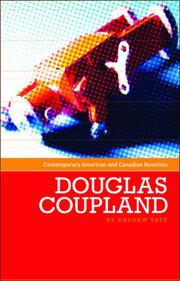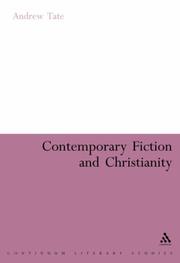| Listing 1 - 7 of 7 |
Sort by
|
Book
ISBN: 9781474233514 1474233511 9781474233507 1474233503 1474233546 147423352X 1474233538 9781474233538 9781474233521 9781474233545 Year: 2017 Publisher: London Bloomsbury Academic, an imprint of Bloomsbury Publishing Plc
Abstract | Keywords | Export | Availability | Bookmark
 Loading...
Loading...Choose an application
- Reference Manager
- EndNote
- RefWorks (Direct export to RefWorks)
"Visions of post-apocalyptic worlds have proved to be irresistible for many 21st-century writers, from literary novelists to fantasy and young adult writers. Exploring a wide range of texts, from the works of Margaret Atwood, Cormac McCarthy, Tom Perrotta and Emily St. John Mandel to young adult novels such as Suzanne Collins's The Hunger Games series, this is the first critical introduction to contemporary apocalyptic fiction. Exploring the cultural and political contexts of these writings and their echoes in popular media, Apocalyptic Fiction also examines how contemporary apocalyptic texts looks back to earlier writings by the likes of Mary Shelley, H.G. Wells and J.G. Ballard. Apocalyptic Fiction includes an annotated guide to secondary readings, making this an essential guide for students of contemporary fiction at all levels."--Bloomsbury Publishing.
Apocalypse in literature. --- Apocalyptic literature. --- American fiction --- Literature, Apocalyptic --- Literature --- Apocalypse in mass media. --- End of the world in literature. --- Mass media --- Englisch, ... --- Andrae, A. --- Oberfinanzrat --- Hannover --- 1925 --- -Zielke-Nadkarni, Andrea --- Zielke-Nadkarni, Andrea --- Hövener, Andreas --- 2013

ISBN: 1781701202 1847791921 9781847791924 9781781701201 9780719074882 0719074886 9780719076619 0719076617 1847796737 Year: 2007 Publisher: Manchester Manchester University Press
Abstract | Keywords | Export | Availability | Bookmark
 Loading...
Loading...Choose an application
- Reference Manager
- EndNote
- RefWorks (Direct export to RefWorks)
This book is the first full-length study of Douglas Coupland, one of the twenty-first century's most innovative and influential novelists. The study explores the prolific first decade and a half of Coupland's career, from Generation X: Tales for an Accelerated Culture (1991) to JPod (2006), a period in which he published ten novels and four significant volumes of non-fiction. Emerging in the last decade of the twentieth century - amidst the absurd contradictions of instantaneous global communication and acute poverty - Coupland's novels, short stories, essays and visual art have intervened in
Coupland, Douglas --- Coupland, Doug --- Criticism and interpretation. --- Literature --- Literature: History & Criticism --- LITERARY CRITICISM / American / General --- Literature: history & criticism --- Accelerated Culture. --- Douglas Coupland. --- Generation X. --- JPod. --- Microserfs. --- Miss Wyoming. --- artifice. --- authenticity. --- global communication. --- poverty.

ISBN: 1441164960 1306844940 9781306844949 9781441164964 9781441161758 9780826489074 1441161759 Year: 2010 Publisher: London: Continuum,
Abstract | Keywords | Export | Availability | Bookmark
 Loading...
Loading...Choose an application
- Reference Manager
- EndNote
- RefWorks (Direct export to RefWorks)
This book provides a detailed exploration of the spiritual and religious contexts and subtexts of contemporary fiction.
American fiction --- English fiction --- Christianity in literature. --- Christianity and literature --- Religion and literature --- Literature --- Literature and religion --- History and criticism. --- History --- Moral and religious aspects --- Christianity in literature --- 820 "18/19" --- 820-97 --- 82:2 --- 82:2 Literatuur en godsdienst --- Literatuur en godsdienst --- 820-97 Engelse literatuur: religieuze literatuur --- Engelse literatuur: religieuze literatuur --- Literature and Christianity --- Christian literature --- 820 "18/19" Engelse literatuur--Hedendaagse Tijd --- Engelse literatuur--Hedendaagse Tijd --- History and criticism --- English fiction century --- Spirituality in literature --- Theology in literature --- American fiction - 20th century - History and criticism --- English fiction - 20th century - History and criticism --- Christianity and literature - United States - History - 20th century --- Religion and literature - United States - History - 20th century --- Christianity and literature - Great Britain - History - 20th century --- Religion and literature - Great Britain - History - 20th century
Book
Year: 2009 Publisher: Leeds: Maney,
Abstract | Keywords | Export | Availability | Bookmark
 Loading...
Loading...Choose an application
- Reference Manager
- EndNote
- RefWorks (Direct export to RefWorks)
Book
ISBN: 9783039119257 3039119257 Year: 2010 Volume: 17 Publisher: Oxford: Peter Lang,
Abstract | Keywords | Export | Availability | Bookmark
 Loading...
Loading...Choose an application
- Reference Manager
- EndNote
- RefWorks (Direct export to RefWorks)
English literature --- Religion and literature --- American literature --- Religion in literature. --- Spirituality in literature. --- History and criticism --- Theory, etc. --- History. --- History and criticism. --- English literature - History and criticism - Theory, etc. --- Religion and literature - Great Britain - History. --- American literature - History and criticism. --- Religion and literature - United States - History.
Book
ISBN: 0826444296 9780826444295 0826446299 9780826446299 1472542835 9786613272041 1283272040 1441157921 9781441157928 9781472542830 9781283272049 6613272043 9781441110725 1441110720 Year: 2010 Publisher: London New York : Continuum,
Abstract | Keywords | Export | Availability | Bookmark
 Loading...
Loading...Choose an application
- Reference Manager
- EndNote
- RefWorks (Direct export to RefWorks)
The New Atheist Novel is the first study of a major new genre of contemporary fiction. It examines how Richard Dawkins's so-called 'New Atheism' movement has caught the imagination of four eminent modern novelists: Ian McEwan, Martin Amis, Salman Rushdie and Philip Pullman. For McEwan and his contemporaries, the contemporary novel represents a new front in the ideological war against religion, religious fundamentalism and, after 9/11, religious terror: the novel apparently stands for everything freedom, individuality, rationality and even a secular experience of the transcendental that religion seeks to overthrow. In this book, Bradley and Tate offer a genealogy of the New Atheist Novel: where it comes from, what needs it serves and, most importantly, where it may go in the future. What is it? How does it dramatise the war between belief and non-belief? To what extent does it represent a genuine ideological alternative to the religious imaginary or does it merely repeat it in secularised form? This fascinating study offers an incisive critique of this contemporary testament of literary belief and unbelief.
Religion and literature. --- Atheism and literature. --- English fiction --- History and criticism --- McEwan, Ian --- Amis, Martin --- Rushdie, Salman --- Pullman, Philip, --- Criticism and interpretation. --- Religion and literature --- History and criticism. --- Literature and atheism --- Literature --- Literature and religion --- Moral and religious aspects --- McEwan, Ian (1948-....) --- Amis, Martin (1949-....) --- Rushdie, Salman (1947-....) --- Pullman, Philip (1946-....) --- Religion et littérature --- Athéisme --- Littérature anglophone --- Critique et interprétation --- Dans la littérature --- 21e siècle --- Religion et littérature --- Athéisme --- Littérature anglophone --- Critique et interprétation --- Dans la littérature --- 21e siècle
Book
ISBN: 1443852457 9781443852456 1299974228 9781299974227 9781443843324 1443843326 Year: 2013 Publisher: Newcastle upon Tyne, UK
Abstract | Keywords | Export | Availability | Bookmark
 Loading...
Loading...Choose an application
- Reference Manager
- EndNote
- RefWorks (Direct export to RefWorks)
Literary texts are more or less obliged to make reference to entities beyond themselves. Drawing on other texts, ideas previously written, or on the resources of language, they make their attempts to communicate, entertain, and enlist sympathy, or even to offer counsel. Some texts profess an a priori vision, others adopt a style of reporting only contingencies.A dialogic relation can be posited between the ideal and the real, heaven and earth, imagination and reason, langue and parole, essence and substance, poetry and prose. The poetic and creative impulse is engaged with an ever present need
Religion in literature. --- Literature --- Appraisal of books --- Books --- Evaluation of literature --- Criticism --- Literary style --- Religion in drama --- Religion in poetry --- History and criticism. --- Appraisal --- Evaluation
| Listing 1 - 7 of 7 |
Sort by
|

 Search
Search Feedback
Feedback About UniCat
About UniCat  Help
Help News
News